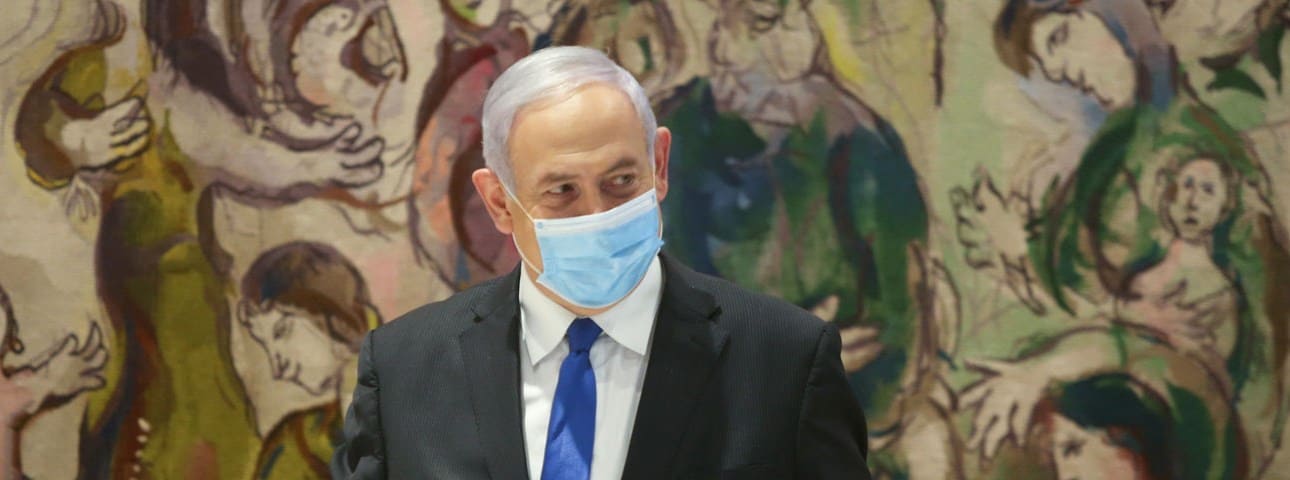Only 27% of Israelis Trust PM Netanyahu to Lead Effort Against COVID-19
New IDI survey: Only 27% trust PM Netanyahu to lead efforts against COVID-19. 32% support current government restrictions & 29% supporting additional measures. 61% of Jewish Israelis don't plan on attending any Yom Kippur services.

Flash 90
A special survey by the Guttman Center for Public Opinion and Policy Research at the Israel Democracy Institute examined public opinion about government policies relating to the coronavirus outbreak and the economic fallout from the pandemic. The survey, the twelfth in this series, finds that only 27% of Israelis trust Prime Minister Benjamin Netanyahu to lead the country's effort against COVID-19. This is down from 57.5% of the population who said that they trusted him in the beginning of April. Additionally, while faith in Professor Ronni Gamzu, Israel's project coordinator, has declined from our last survey, 51% of the public still says that they have faith in his efforts.
With the solemn day of Yom Kippur approaching, 61% of Jewish Israelis say that they do not intend to attend synagogue at all this year and only 34% say plan on coming to some, or all of the services. This is a reversal of last year's results when 54% of respondents said they had planned on attending a portion of the services while 39% said they would not visit a synagogue at all on the holiest day of the Jewish calendar.
Survey Highlights
Overcoming the current crisis–optimistic or pessimistic – Public optimism about the chances of recovery continues to decline– and is the lowest since the first survey in March – 48% among Jewish Israelis and 28% among Arab Israelis.
Optimistic about Israel society's ability to overcome the current crisis (%, Jews, Arabs)
Fear for the future – Most Israelis (61%) fear their economic future.
Fear for their economic future (%, general public)
Segmentation of the degree of concern for the economic future by income shows that while among average income earners the degree of concern has hardly changed, among above-average income earners it has risen from 35% a month ago to 47% today. Even among below-average income earners, we found an increase in concern for the economic future (from 66% to 71%), although it was more moderate than among high-income earners.
Fear their economic future (%, total sample, by income)
Trust in leadership and experts – The decrease in the degree of trust in the Prime Minister is both in the Jewish public (from 37.5% to 29.5%) and in the Arab public (from 21% to 15%).
Trust Prime Minister Netanyahu in leading the effort against the Corona crisis (%, total sample)
In this survey as in the previous one, most Israelis trust Prof. Ronni Gamzu, the national coronavirus project coordinator, albeit at a lower rate (51% today compared to 59.5% in August). Among the Jews, 54% have confidence in Gamzu, compared with 34% in the Arab public. Most of the decline among Jewish Israelis in trust in Prof. Gamzu is among the ultra-Orthodox (from 58% a month ago to only 27% today).
Lockdown - While in April a majority of over 60% of Israelis thought government decisions about quarantine were appropriate, today the public is more or less divided into three: about a third think they are appropriate, and similar rates think they are too strict or too lenient.
What do you think about the restrictions that the Israeli government has set on public conduct to prevent infection with the corona virus? (%, Sample total, April and September 2020)
Synagogue on Yom Kippur – The rate of those who plan not to go to synagogue on Yom Kippur increased significantly this year compared to last year (from 39% to 61%). Respectively, there has been a decrease in the rate of those who plan to go to all the prayers, to some of the prayers even just to blow the shofar at the end of the fast. Nevertheless, 73% of the ultra-Orthodox, 56% of the religious and 66% of the traditional religious plan on going to synagogue on Yom Kippur.
Do you intend to go to the synagogue on Yom Kippur, 2019 and 2020 (%, Jews)
The Israel in the Time of Coronavirus 12 survey is a project of the Guttman Center for Public Opinion and Policy Research of the Israel Democracy Institute. In the survey, which was conducted on the internet and by telephone (to supplements the numbers of respondents among groups that are not sufficiently connected to the internet, on September 15-17 2020, 603 men and women were interviewed in Hebrew and 151 in Arabic, constituting a representative national sample of the entire adult population of Israel aged 18 and older. The maximum sampling error for the entire sample was 3.7%± at a confidence level of 95%. The fieldwork was conducted by the Rafi Smith Institute under the direction of Rafi Smith. For the full data file see: Data Israel.
